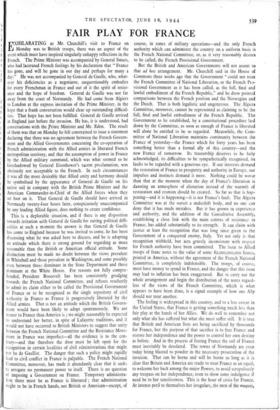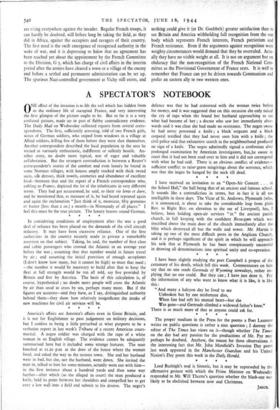FAIR PLAY FOR FRANCE E XHILARATING as Mr. Churchill's visit to
France on Monday was to British troops, there was an aspect of the event which must have inspired singularly unhappy reflections in the French. The Prime Minister was accompanied by General Smuts, who had lacerated French feelings by his declaration that " France has gone, and will be gone in our day and perhaps for many a day." He was not accompanied by General de Gaulle, who, what- ever his deficiencies as a negotiator, unquestionably embodies for every Frenchman in France and out of it the spirit of resist- ance and the hope of freedom. General de Gaulle was not far away from the coast of Normandy. He had come from Algiers to London at the express invitation of the Prime Minister, in the hope that a frank conversation would clear up outstanding difficul- ties. That hope has not been fulfilled. General de Gaulle arrived in England just before the invasion. He has, it is understood, had conversations with the grime Minister and Mr. Eden. The result of them was that on Monday he felt constrained to issue a statement declaring that there was no agreement between the French Govern- ment and the Allied Governments concerning the co-operation of French administration with the Allied armies in liberated French metropolitan territory, and that the assumption of power in France by the Allied military command, which was what seemed to be foreshadowed by General Eisenhower's recent proclamation, was obviously not acceptable to the French. In such circumstances it was all the more desirable that Allied unity and harmony should be symbolised by the appearance of General de Gaulle on his native soil in company with the British Prime Minister and the American Commander-in-Chief of the Allied forces when they set foot on it. That General de Gaulle should have arrived in Normandy twenty-four hours later, conspicuously unaccompanied by any leading Allied figure, does nothing to create confidence.
This is a deplorable situation, and if there is any disposition towards irritation with General de Gaulle for raising political diffi- culties at such a moment the answer is that General de Gaulle has come to England because he was invited to come, he has been discussing what he was asked here to discuss, and he is adopting an attitude which there is strong ground for regarding as more reasonable than the British or American official attitude. Some distinction must be made no doubt between the views prevalent in Whitehall and those prevalent in Washington, and some possibly even between those dominant in the State Department and those dominant at the White House. For reasons not fully compre- hended, President Roosevelt has been consistently grudging towards the French National Committee, and refuses resolutely to admit its claim either to be called the Provisional Government Of France or to be recognised as the single repository of civil authority in France as France is progressively liberated by the Allied armies. That IS not an attitude which the British Govern- ment would have been likely to adopt spontaneously. We are nearer to France than America is ; we might reasonably be expected to understand her better, in spite of Lafayette traditions, and it would not have occurred to British Ministers to suggest that unity between the French National Committee and the Resistance Move- ment in France was imperfect—all the evidence is to the con- trary—and that therefore the door must be left open for the recognition in certain localities of civil administrations that might not be de Gaullist. The danger that such a policy might rapidly lead to civil conflict in France is palpable. The French National Committee, moreover, has made it abundantly clear that it seeks to arrogate no permanent power to itself. There is no question of imposing a Government on France. Temporary administra- tion there must be as France is liberated ; that administration ouglit to be in French hands, not British or American—except, of course, in zones of military operations—and the only French authority which can administer the country on a uniform basis is the French National' Committee, or, as it very reasonably desires to be called, the French Provisional Government.
But the British and American Governments will not assent to that ad hoc arrangement. Mr. Churchill said in the House of Commons three weeks ago that the Government " could not treat the French Committee *of National Liberation, or the French Pro- visional Government as it has been called, as the full, final and lawful embodiment of the French Republic," and he drew pointed comparisons between the French position and the Norwegian and the Dutch. That is both legalistic and ungenerous. The Algiers Committee, moreover, cannot be represented as claiming to be the full, final and lawful embodiment of the French Republic. The Government to be established, by a constitutional procedure laid down by the Committee, as soon as enough of France is liberated will alone be entitled to be so regarded. Meanwhile, the Com- mittee of National Liberation maintains continunity between the France of yesterday—the France which for forty years has been something better than a formal ally of this country—and the new France of tomorrow. Its trusteeship deserves to be fully acknowledged, its difficulties to be sympathetically recognised, its faults to be regarded with a generous eye. If our interests demand the restoration of France to prosperity and authority in Europe, our impulses and instincts demand it more. Nothing could be worse than that at the moment when the day of France's liberation is dawning an atmosphere of alienation instead of the warmth of restoration and reunion should be created. So far as that is hap- pening—and it is happening—it is not France's fault. The Algiers Committee was at the outset a makeshift body, and no one can deny that it has made mistakes. But it has grown in experience and authority, and the addition of the Consultative Assembly, establishing a close link with the main centres of resistance in France, has added substantially to its strength. It can claim with justice at least the recognition that was long since given to the Government of a conquered enemy, Italy. Yet not only is that recognition sGithheld, but acts gravely inconsistent with respect for French authority have been committed. The issue to Allied troops of franc notes to the value of some 82,000,000,000 francs, printed in America, without the agreement of the French National Committee, is completely indefensible. The troops, of course, must have money to spend in France, and the danger that this issue may lead to inflation has been exaggerated. But to carry out the whole arrangement and begin the distribution of the notes regard- less of the views of the French Committee, which is what appears to have been done, is a signal example of how one Ally should not treat another.
The feeling is widespread in this country, and to a less extent in the United States, that France is getting something much less than fair play at the hands of her Allies. We do well to remember not only what she has suffered but what she must suffer still. It is true that British and American lives are being sacrificed by thousands for France, but the purpose of that sacrifice is to free France and restore her independence and the power to control her own destiny as before. And in the process of freeing France the soil of France must inevitably be desolated. The towns of Normandy are even today being blasted to powder in the necessary prosecution of the invasion. That can be borne and will be borne so long as it is clear that Britain and America are ready to treat France as an equal, to welcome her back among the major Powers, to avoid scrupulously any trespass on her independence, even to show some indulgence if need be to her sensitiveness. This is the hour of crisis for France. At intense peril to themselves her irregulars, the men of the moguls, are rising everywhere against the invader. Regular French troops, it can hardly be doubted, will before long be taking the field, as they did in Africa, against the occupiers and ravagers of their country. The first need is the swift emergence of recognised authority in the wake of war, and it is depressing to ktiow that no agreement has been reached yet about the appointment by the French Committee to the Division, G 5, which has charge of civil affairs in the interim period after the armies have cleared a town or a village of the enemy and before a settled and permanent administration can be set up. The spurious Nazi-controlled government at Vichy still exists, and nothing could give it (or Dr. Goebbels) greater satisfaction than to see Britain and America withholding full recognition from the one body which represents French interests, French patriotism and French resistance. Even if the arguments against recognition were weighty circumstances would demand that they be overruled. Actu- ally they have no visible weight at all. It is not on argument but on obduracy that the non-recognition of the French National Com- mittee as the Provisional Government of France rests. It is well to remember that France can yet be driven towards Communism and prefer an eastern ally to two western ones.



























 Previous page
Previous page